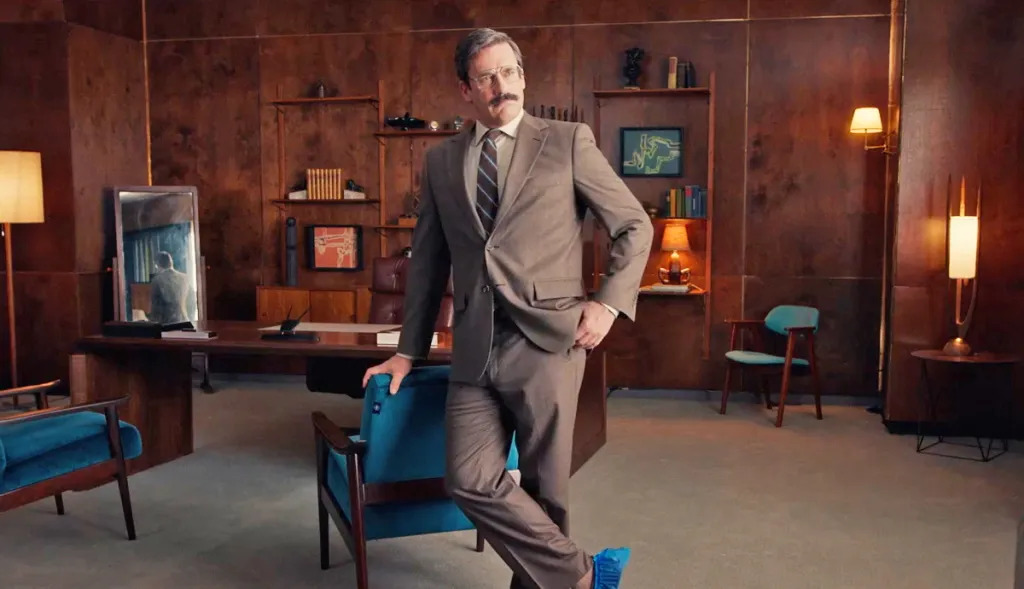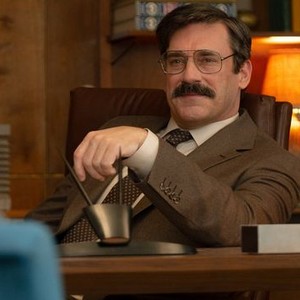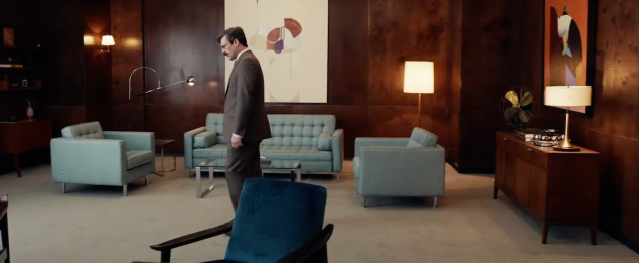Corner Office: The Danger of the Isolation

Corner Office (2023) starring Jon Hamm was a bit of a failure, critically and commercially despite winning an award at the Tribeca Film Festival. Based on the 2015 Jonas Karlsson book, “The Room” the story is a case study of a man who’s growing more alienated from reality until finally he snaps. Not in a violent sense, but still in a psychotic sense.
The central character, Orson, also serves as the narrator for the story though not omniscient. He’s employed by a company named, “The Authority” and views himself as the brightest worker in the office.
The audience is introduced and guided through the world by Orson’s voice and it’s through his eyes we see first see “The Room”.
Paradise
When the corner office is revealed, one could be mistaken for being a bit underwhelmed. It’s an aesthetic not dissimilar to the old-fashioned offices of the 50s, 60s, or 70s. It speaks to a bygone era of office work where the bosses were always white men who played golf and had young secretaries to cheat on their spouses with.
This is in contrast to the cubicles and even more dreaded “open” workspaces. The contrast between a corner office and a cubicle is the contrast between an employee and an owner. A cubicle worker is as replaceable as a pen or a keyboard. But someone in the corner office is someone who must be acknowledged. Someone who must be respected. Someone with prestige and titles who you have to show deference to.
The corner office can be defined in one word–Power. The power to isolate yourself from the world but also to control whomever you brought to it.

It’s a show of power for Orson to bring his more slovenly coworker Rakesh into the corner office, to chastise him for his files being on the workspace of Orson.
The only problem is the corner office doesn’t exist.
The film, in contrast to the book, reveals early on, that there’s no office, that Orson just stands, unresponsively, in front of a wall for his time “in the office”, that he and Rakesh didn’t have a conversation, and moreso, Orson’s behavior is so aberrant it’s become the hot topic of the office.
Hubris
When people are confronted there’s a myriad of ways they can react. Some become apologetic, others jovial in their error response. But many react with hostility to slights both real and imagined.
Orson, is the latter, first seen when his manager reminds him of the shoe covers in the office as to “remember the floor” i.e. don’t track water and snow inside.
For some, this reminder would be little more than a quick acknowledgment and correction. For Orson, he stews in his rage at being admonished remarking that not only wasn’t his mistake his fault, but also his boss had embarrassed him in front of his coworkers.
Orson, over the course of the film, is shown to have 2 notable qualities. A high view of himself and an awkward relationship with other people.
When he walks in to get his coffee from the break room, he notices the light bulb flickering and comments on how no one else has fixed it. And then proceeds to leave it unfixed.
He very clearly believes himself better than his coworkers and thus when it’s first revealed he’s seen as the office weirdo his hostility rises. When a meeting is called he speaks to the office culture, his perception of them bullying him, and then a reassertion of his superiority but ordering them out of his manager’s office.
He’s immediately chastised by his manager and begins his (self-imposed) penance but the key thing to note is his affinity for authority. He didn’t hesitate to speak to everyone as though they were beneath him and even when “working his way back up” he made no strides to become friendly with his coworkers.
This though can’t just be put on his coarse nature. Orson is shown in his interactions with the desk clerk, Alyssa, to not really “get” interactions with people. In what is a perfunctory scene in most romantic comedies, exchanging names, Alyssa gives hers and Orson doesn’t know how to respond. He doesn’t even think to give his name in response.

In the climax of the film, after he’s been fired for his “room” he comments on the disposable nature of himself and the other workers in the office but it rings hollow because he’s made no effort to get to know his fellow workers as people. To Orson, they were less efficient cogs in the machine.
Bricks in Wall
He’s not wrong, but it does raise an eyebrow as to how he was so sure of himself until he was let go. He was set on his revenge on others. But as soon as he was let go he began talking about. “us” and “we”.
The film never clearly states, what “The Authority” does. The key decision maker for the climax, the Vice President, is never seen. The majority of the workers in 29 divisions of the building aren’t given so much as an afterthought.
What the film creates is a universality of alienation. Orson is a worker but he could be anywhere. His job could be anything and his coworkers and bosses could be anyone.
Orson looked in his drab, gray workspace and saw somewhere he could bloom. Despite his setbacks he did, eventually bloom. But did so in a way that was unacceptable to his coworkers, his “lesser”. But it wasn’t them asking for him to be fired that got him fired, or him quitting. It was the whims of his boss, someone who Orson, presumably hasn’t even been in the same space as him.
Orson’s impassioned speech about the nature of business is moving but hollow for someone who’d gladly step over his coworkers to rise to the top of the ladder.
His work in the office whatever it was, was seen as incredible, company shifting. But himself, as a worker? Was just another person. Perhaps if he’d built connections with the others, if his dream wasn’t his personal paradise but a connection with others he may have had more advocates to keep his job.
But then again, the company was already considering downsizing.
Lost

At the end of the film, after Orson has said his piece, he looks like he’s going to leave but then leads the security guards on a chase for his final entrance to the office.
Orson basks in his freedom from the world, but in reality, he’s surrounded by guards with his face in a wall.
Of note is the empathy in his coworkers’ voices. He has been escorted out only to return to that wall. In their shoes, it would be easy to be cruel or preformatively mean but instead, it’s a reflexive concern. Despite him making no effort to see them as people, real people, they still are, and in the face of his collapse, they’re the only ones who care.
What do you think? Leave a comment.











Really do like the lead actor but shame that the story is predictable and not as exciting.
At least there is a decent score!
It’s one of those movies that allows you to ponder absurdity while your brain watches in the background. Not everyone’s cup of tea, especially if you’re expecting a typical comedy.
As someone who suffers from Depersonalization and Schizoid disorder, this movie hit me in the most unexpected way possible.
Whoever wrote it, knows how it feels to live trapped inside your own mind, where it becomes your only safe space in which you can finally be your real self (emotionally and intellectually), where it becomes “The Corner Office”.
This was a good movie. Made sense and was relatable.
The insanity of corporate culture and what people are really trying to achieve, just like the ending of succession, roman says we are a joke. So is all the hustle at the end of it all.
Love seeing this on the site! Such an engaging article, and it was a pleasure to edit! Great work, thank you!
I have a theory. The whole thing is a representation of his mind. The name of the company is Authority Inc. All the characters are aspects of self, hence why the main character is descriptive of each person. The EVP is the higher power. The corner office is the imagination. The receptionist represents his desire for love. Notice how he never goes home, nor do we ever see him outside of the parking lot and the office. Everything around him is so surreal as well, it’s hard to believe the entire place is actually an office.
Yeah it seemed like he made it all up or he actually did work in the company but he didn’t do any of his work and was just hired to look after the printers and take care of the office supplies, notice how he didn’t have a divider like the others, it seems like he wasn’t very important in the company.
I like it!! It is weird but you can see In the mind of someone with mental problems who finds peace in his own mind
It was interesting to see it manifested, and how much it meant to him.
I just watched the movie cause I wanted to watch movies with radiohead songs but it was actually a really good watch
I’m puzzled why this movie is labelled as a comedy as nothing is really funny. I liked it though and Hamm is perfect as Orson, but ultimately it’s forgettable as the movie lacks a good ending.
I was just thinking, “if I hear the word ‘comedy’ with this movie ONE more time …”. It was a tragedy. NOT a comedy. As for the ending, I think it signifies him going into a state in which he can’t be reached. He’s locked the door. He’s not moving, and in reality, possibly catatonic? Who knows.
The movie was just goofy I guess that’s why they called had it marked as a comedy too. I actually laughed a few times tbh
This is not a comedy. I guess there are satirical elements but it does not poke fun of anything.
This was a psychological drama.
Just watch the movie. Great music/ambience. Beautiful sometimes gave the same vibes of sofia Coppola’s lost in translation.
I really wish it would have had a theatrical release. I understand why it didnt, maybe, but i would have watched it in theaters.
I loved this movie. I took a lot of meaning from it.
The movie isn’t about corporate lifestyle or the secret of the room.
It’s a exposé on the troubles someone has working with a undiagnosed, acute, vague, mental illness, and not knowing it. The protagonist is OCD and perhaps even has Asperger condition. The room is (clearly) a metaphor for his disassociation; receding into his mind during periods of stress. He cannot cope with confrontation nor mature relationships or intimacy.
100%.
I liked the movie, it really showed how gifted people wheter they are on the spectrem or with a cognitive condition have that one sort of gift like calculating and knowing all sort of fonts at the expense of not having an up to expectation manners that puts them under the spotlight of judgement and sometimes insanity.
I think it gave a very private glimpse into the mind of a gifted mind with austism or Asperger.
I don’t know why it’s labelled as a “comedy” because there is little to laugh about. It’s more a mystery/fantasy drama.
If you have not worked in open plan offices you may not get alot of the humour in this but it is a great film in my opinion – I’ve already watched it twice.
Hamm is killing it.
Anyone who has ever worked at an office will know what the movie is trying to say.
“Trying” and ultimately failing.
i liked the winter and lifeless style of it and although i have no ideea what the point was , it hit right in the cubical.
This film is a fantastic meditation on how it feels to work in an office environment as an individual with autism. It gave me the shivers as it really understands the pains I felt as an office drone in the pre-covid era. I guess it will be remembered as a love-it-or-hate-it thing.
Really felt disappointed at the end of the movie.
This movie would have worked if David Lynch directed it.
I loved it! Perfect portrayal of the office environment from and introverts perspective. Maybe with an added layer of ocpd. Make no mistake this is a movie about mental illness.
A good example of a quirky movie done POORLY. An example of a quirky movie done GREAT is The Lobster.
Movie looks amazing!!!
I liked it. The banality made it interesting.
I wasted my time watching this movie.